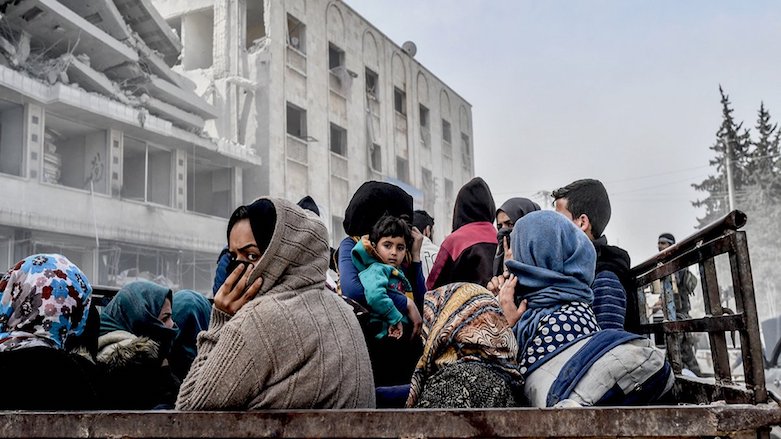German NGO scraps Syria project over claims it would aid Turkey's ethnic cleansing in Afrin

ERBIL (Kurdistan 24) - One of Germany’s largest aid organizations has canceled a project in the Syrian city of Afrin to restore 400 houses after widespread criticism from human rights and humanitarian groups in both northeast Syria and Germany that the effort could, in effect, assist in Turkey’s program of forcible demographic change there.
“The German organization Welthungerhilfe had decided to repair and renovate houses, but they were houses stolen from the people of Afrin. These houses were used by Islamist groups supported by Erdogan. Many organizations, including the Society for Threatened Peoples (GfbV), criticized the decision,” Kamal Sido, a Middle East expert at the German-based GfbV told Kurdistan 24.
He said a press statement that, after the claims were widely covered by the German media, organizers decided to shelve the project.
This also came after 28 organizations, associations, and media networks based in northeast Syria sent a letter to Welthungerhilfe, calling on it to withdraw support and financing to restore seized homes in Afrin.
Following criticism by 28 human rights organizations, German NGO @Welthungerhilfe has cancelled a project in Afrin.
— Rojava Information Center (@RojavaIC) November 11, 2020
The NGO had planned to refurbish houses belonging to displaced Kurds, but now housing Arabs transferred as part of Turkey's program of forcible demographic change. pic.twitter.com/aTnswKOv3I
Welthungerhilfe said in an initial statement that it “takes the allegations concerning a planned project activity in Afrin very seriously.”
“According to the UN, some 410,000 internally displaced persons (IDPs) have fled to the regions of Afrin and A’zaz, thus increasing the needs of the host communities and overstretching the capacity of the refugee camps. Their greatest need is for safe and adequate shelter, access to food and other relief supplies. As until today, no repairs have been made to houses,” the organization said.
It continued, explaining that “extensive analysis” was carried out in the Afrin region before the project. “These analyses were coordinated, inter alia, with local community representatives in Afrin and working groups of the United Nations.”
On Tuesday, the group tweeted, “After evaluating all information, we have come to the conclusion that we will not repair the destroyed houses, as our basic principles of humanitarian aid, e.g. neutrality, cannot be guaranteed.”
Statement on criticism of a planned project in Afrin Syria. After evaluating all information, we have come to the conclusion that we will not repair the destroyed houses, as our basic principles of humanitarian aid, e.g. neutrality, cannot be guaranteed. https://t.co/5mtkYMLFrW
— Welthungerhilfe (@Welthungerhilfe) November 10, 2020
Before the cancelation of the project, pro-Kurdish organizations accused the German NGO helping Turkish plans to intentionally destroy the longtime Kurdish majority of the Afrin region.
The Syria-based Violation Documentation Center said in a tweet last week that the German NGO was “taking a major role in the Turkish main plan of demographic change in Afrin by financing a project to clad the houses whose residents have been displaced by the pro-Turkish militias, aiming to resettle those from Eastern Ghouta.”
The German aid organisation @Welthungerhilfe is taking a major role in the Turkish main plan of demographic change in Afrin by financing a project to clad the houses whose residents have been displaced by the pro-Turkish militias, aiming to resettle those from Eastern Ghouta. pic.twitter.com/oaAAMTX7wi
— VdC-NsY \ Northern Syria (@vdcnsy) October 28, 2020
A report by the Office of the United Nations High Commissioner for Human Rights (OHCHR) published in June 2018, confirmed that that thousands of fighters, their family members, and civilians displaced and evacuated from Eastern Ghouta, rural Homs, and Hama Governorates are now occupying homes of mostly Kurdish civilians who fled Afrin from Turkey’s occupation in 2018.
“Many civilians seeking to return to their homes have found them occupied by these fighters and their families, who have refused to vacate them and return theto their rightful owners,” the report said.
The OHCHR also expressed concerns that permitting ethnic Arabs to occupy houses of Kurds who have fled effectively prevents the Kurds from returning to their homes and may be an attempt to change the ethnic composition of the area permanently.
Helin Evrim Sommer, a member of the German parliament and development policy spokesperson for the Left Party parliamentary group, told Kurdistan 24 “Humanitarian aid must not be misused to consolidate the illegal occupation of Afrin by the Erdogan regime and allied Islamist mercenaries. I therefore welcome the decision of the Welthungerhilfe to cancel its project.”
However, she added “this decision should also be a warning signal for other humanitarian aid organizations in Afrin, whose projects could potentially become the plaything of Turkish and Islamist interests.”
Editing by John J. Catherine
